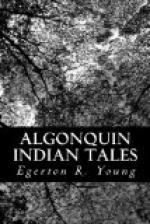ILLUSTRATIONS
The rabbit tells Nanahboozhoo of his troubles
With the children cuddled around, Souwanas began
The wild and picturesque Ka-ka-be-ka Falls
They howled with rage and terror
The startling placard
While her mate stood beside her
Surrounding them were fierce Indian dogs
The beautiful reflections in the water
They tumbled the tall ghost over
Their dog trains were in constant demand
Where the fire was stolen
The coyote was too quick for them
Across a single log at a dizzy height
Which white men now call Cathedral Mountain
Their babies with them
Gave him such a terrible beating
The big rock was surely gaining on him [note: not in actual text]
Sun dance lodge of the Blood Indians
They both threw their magic sticks
He took a leap into the open mouth
He ran away west, to the great mountains
Wigwams and Indians
The Indian story-teller
Nanahboozhoo then mounted on the back of the great buzzard
With Mary and Kennedy in the birch canoe
Nanahboozhoo gave him a great push
They were excited at his coming
Algonquin Indian Tales
CHAPTER I.
The Children Carried Off by the Indians—The Feast in the Wigwam—Souwanas, the Story-teller—Nanahboozhoo, the Indian Myth—How the Wolves Stole His Dinner, and Why the Birch Tree Bark is Scarred—Why the Raccoon has Rings on His Tail.
Without even knocking at the door there noiselessly entered our northern home two large, unhandsome Indians. They paid not the slightest attention to the grown-up palefaces present, but in their ghostly way marched across the room to the corner where the two little children were playing on the floor. Quickly but gently picking them up they swung them to their shoulders, and then, without a word of salutation or even a glance at the parents, they noiselessly passed out of that narrow door and disappeared in the virgin forest. They were pagan Saulteaux, by name Souwanas and Jakoos.
The Indian names by which these two children were called by the natives were “Sagastaookemou,” which means the “Sunrise Gentleman,” and “Minnehaha,” “Laughing Waters.”
To the wigwam of Souwanas, “South Wind,” these children were being carried. They had no fear of these big Indians, though the boy was only six years old, and his little sister but four. They had learned to look with laughing eyes even into the fiercest and ugliest of these red faces and had made them their friends.




